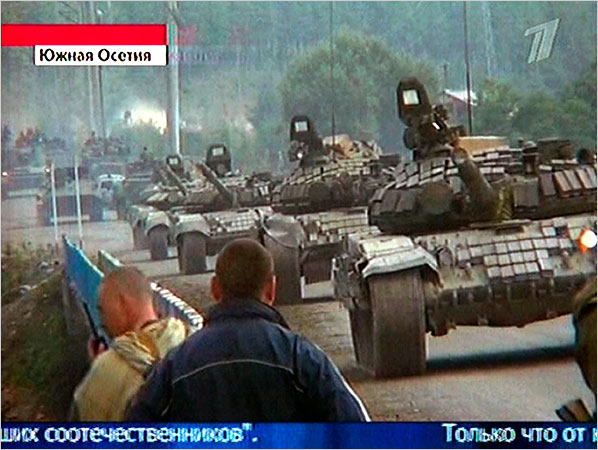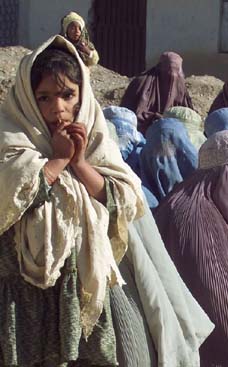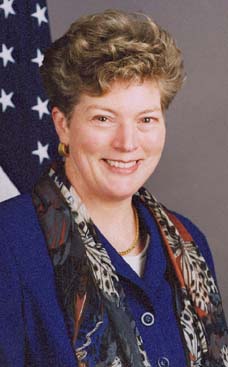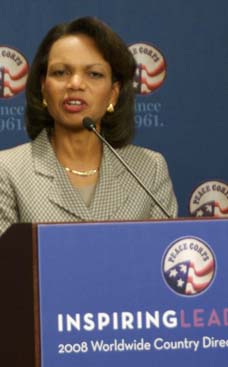
Georgia is a strong American ally whose shift toward the West and pursuit of NATO membership has angered Russia. Washington said Friday that it would send an envoy to the region to try to broker an end to the fighting. The clashes raised the specter of a wider conflict in the Caucasus region, a key conduit for the flow of oil from the Caspian Sea to world markets and an area where violent conflict has flared for years along Russia’s borders, most recently in Chechnya. Georgian forces said Friday that they had won control of the capital of the rebel enclave, South Ossetia, but Russian peacekeepers in the city said they had not seen Georgian troops in the capital, Tskhinvali. One unconfirmed report said Georgian forces had shot down two Russian planes; Georgia said its aircraft had bombed a convoy of Russian tanks that moved into the area.
Russia sent troops rolling into a breakaway region of Georgia after Georgian troops sought to enter the capital of the pro-Russian enclave, in a sharp escalation of the longstanding conflict
Russia Sends Troops Into Rebel Enclave in Georgia
By ANNE BARNARD and ANDREW E. KRAMER
Published: August 8, 2008
Caption: A TV image of what Russian Channel 1 says is a convoy of Russian tanks moving towards Tskhinvali on Friday. Photo: ORT Russian Channel 1, via Associated Press
MOSCOW — Russia sent troops rolling into a breakaway region of Georgia on Friday after Georgian troops sought to enter the capital of the pro-Russian enclave, in a sharp escalation of the longstanding conflict.
Russian Prime Minister Vladimir V. Putin declared that “war has started” and President Mikheil Saakashvili of Georgia accused Russia of a “well-planned invasion," saying he had mobilized Georgia’s military reserves.
Georgia is a strong American ally whose shift toward the West and pursuit of NATO membership has angered Russia. Washington said Friday that it would send an envoy to the region to try to broker an end to the fighting.
The clashes raised the specter of a wider conflict in the Caucasus region, a key conduit for the flow of oil from the Caspian Sea to world markets and an area where violent conflict has flared for years along Russia’s borders, most recently in Chechnya.
Georgian forces said Friday that they had won control of the capital of the rebel enclave, South Ossetia, but Russian peacekeepers in the city said they had not seen Georgian troops in the capital, Tskhinvali. One unconfirmed report said Georgian forces had shot down two Russian planes; Georgia said its aircraft had bombed a convoy of Russian tanks that moved into the area.
Russia’s Channel 1 television showed Russian tanks entering South Ossetia. It reported that two battalions reinforced by tanks and armored personnel carriers were approaching the capital.
The Russian Defense Ministry said it was sending reinforcements to protect its peacekeepers already on the ground there.
Separatist leaders in Tskhinvali said casualties were in the hundreds, though the claim was impossible to verify. Eduard Kokoity, the president of South Ossetia, told the Russian news agency Interfax that hundreds of civilians had been killed.
The White House spokeswoman, Dana Perino, said the Bush administration had been talking to both sides to resolve the crisis.
“We urge restraint on all sides — that violence would be curtailed and that direct dialogue could ensue in order to help resolve their differences,” she said.
The European Union and NATO also called Friday for Russia and Georgia to end the hostilities.
German Chancellor Angela Merkel issued a statement calling on both sides to use “the greatest prudence and restraint" and “to halt the use of force immediately."
Germany has taken a leading role in trying to ease tensions between Russia and Georgia over the other breakaway Georgian province of Abkhazia. Germany’s foreign minister, Frank-Walter Steinmeier, traveled to Georgia, Abkhazia and Russia last month with a peace proposal.
South Ossetia and Abkhazia gained de facto independence from Georgia in the late 1990s, after the collapse of the Soviet Union. The region settled into a tenuous peace monitored by Russian peacekeepers, but frictions with Georgia increased sharply in 2004, when Mr. Saakashvili came to power and made national unification a centerpiece of his agenda. Since then an uneasy truce has reigned, with fighting between South Ossetia and Georgian forces erupting sporadically.
Earlier this year, Russia announced that it was broadly expanding support for the separatist region.
The latest clashes between the Georgian military and separatist forces began last weekend. South Ossetia accused Georgia of firing mortars into the enclave after six Georgian policemen were killed in the border area by a roadside bomb. As tensions grew, South Ossetia began sending women and children out of the enclave.
Analysts said that Georgia could be trying to seize an opportune moment — with world leaders focused on the start of the 2008 Olympics in Beijing this week — to reclaim the territory. Russia also may be seeking to draw attention away from another breakaway Georgian region, Abkhazia, where it has been under pressure to allow a settlement between pro-Russian and pro-Georgian factions, analysts said.
The refugee crisis appeared to intensify Friday as relief groups said thousands of refugees, mostly women and children, were now streaming across the border into the North Caucasus city of Vladikavkaz in Russia in an attempt to escape the fierce fighting.
President Dmitri A. Medvedev of Russia promised to “punish” those responsible for what he called “a deep violation of international law” by Georgia that he said had led to the deaths of Russian citizens and Russian peacekeepers stationed in Tskhinvali.
“I am obligated to defend the lives and dignity of Russian citizens, wherever they are located,” he said in an address carried on Russian state television. “We will not allow the unpunished killing of our fellow citizens. Those who are guilty will suffer the punishment they deserve.”
Soldiers from South Ossetia, a breakaway Georgia enclave, on Thursday near Tskhinvali, where heavy fire was reported.
At midday Friday, Georgian army units were trying to seize Tskhinvali using heavy machine guns and mortars in firefights with separatist paramilitary fighters, Shota Utiashvili, an official at the Interior Ministry of Georgia, said in an interview.
“Now, the army will have to take the capital,” he said, citing “massive fire” aimed at Georgian troops by fighters inside the city.
The head of a Russian peacekeeping force in the city, Marat M. Kulakhmetov, said in a telephone interview that the city had come under “massive attack” by the Georgians and that civilians had been wounded. As he spoke, shooting could be heard in the background.
Mr. Utiashvili, the Georgian official, said Georgians had seen Russian forces, including “hundreds of soldiers and dozens of armored vehicles, including tanks,” move up the military highway into the Caucasus Mountains that ties the separatist enclave to Russia.
By morning, they had passed through a mountain tunnel into the northern portion of the enclave, he said. “They are on Georgian territory now.”
“We don’t know whether they are militias or regular Russian forces,” he said. “As they carry heavy equipment, we think they must be regulars. We don’t know. We just know they are coming to attack us.”
He said Georgian Su-25 ground attack airplanes had struck the convoy and that the Georgians believed they had caused casualties and destroyed Russian armored vehicles.
A spokesman for Teimuraz Mamsurov, the president of the semiautonomous Russian republic of North Ossetia, which borders the disputed territory, said the Georgian planes had struck an automobile convoy shipping humanitarian aid from Vladikavkaz to South Ossetia.
He said he had no information about the sighting of Russian tanks.
The Georgian military fired on Russian fighter jets that bombed Georgian territory and strafed Georgian positions at about 11 a.m. Moscow time, Mr. Utiashvili said.
Georgian officials said Russian jets were bombing Georgian targets outside the South Ossetian enclave, including military bases at Marneuli and Vaziani, causing casualties and destroying several Georgian planes.
Georgia recalled its ambassador to Moscow Friday afternoon, the official Russian news agency RIA-Novosti reported.
In Gori, a city outside South Ossetia and about 12 miles from Tskhinvali, residents said there had been sporadic bombing all day near the border with the breakaway region.
Impact vibrations could be felt Friday evening in the center of Gori, where a Russian bomb fell near a textile factory and a cell phone tower, leaving a crater about 12 feet in diameter.
Meanwhile, Russian citizens in South Ossetia called on Russia to intervene. “We are being killed by Georgian aggressors,” they said in a letter posted on an official Web site maintained jointly by South Ossetia and North Ossetia.
“We, hiding in the basement of a house, showered by bombs, are not feeling now that we are citizens of a great country. We hear Russia has a great air force and excellent planes. Protect your citizens. You are our last hope.”
The Russian Defense Ministry said Friday afternoon that it would protect Russian citizens in the territory and Russian peacekeepers who came under fire in Tskhinvali.
“The Georgian leadership has unleashed a dirty adventure,” the ministry said in a statement, posted on its Web site. “The blood shed in South Ossetia will remain on the conscience of these people and their entourage. We will not allow anyone to do harm to our peacekeepers and citizens of the Russian Federation.”
Mr. Utiashvili, the Georgian Interior Ministry official, said that about 10 Russian jets dropped seven or eight bombs on Georgian territory outside South Ossetia. The jets struck a police station in Kareli and a radar station in Gori — hitting two cities near the Georgian capital of Tblisi — and wounded several people, he said.
Reporting was contributed by Nikolai Khalip and Ellen Barry from Moscow, Michael Schwirtz from Gori, and Nicholas Kulish from Berlin.










